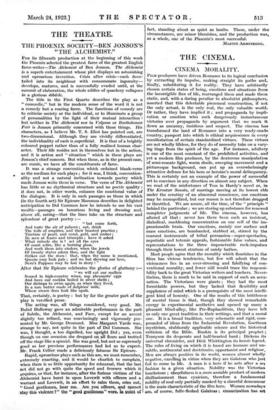THE THEATRE.
THE PHOENIX SOCIETY—BEN JONSON'S "THE ALCHEMIST."
Pon its fifteenth production at the beginning of this week the Phoenix selected the greatest farce of the greatest English farce-writer—The Alchemist of Ben Jonson. The Alchemist is a superb entertainment whose plot displays an astonishing and uproarious invention. Crisis after crisis—each dove- jailed into its neighbour with consummate ingenuity— develops, matures, and is successfully evaded until, at the summit of elaboration, the whole edifice of quackery collapses in a glorious ddbdele.
The title in the First Quarto describes the play as a " comoedie," but in the modern sense of the word it is not a comedy but a roaring farce. The functions of comedy are to criticize society or the individual, or to illuminate a group of personalities by the light of their mutual interaction : but neither in The Alchemist nor in Volpone or Bartholomew Fair is Jonson primarily concerned with these things. His
characters, as I believe Mr. T. S. Eliot has pointed out, are two-dimensional. Although they are vividly differentiated, the individuality of each is superficial. It is that of a brightly
coloured puppet rather than of a fully realized human char- acter. Their life resides not in themselves but in the action, and it is action and " situation " which in these plays are Jonson's chief concern. But when these, as in the present case, are comic, we have all the constituents of farce.
It was a strange convention which ordained blank-verse as the medium for such plays ; for it was, I think, convention- ality and not a natural inclination towards poetry which made Jonson write them'in verse. The verse of The Alchemist has little or no rhythmical structure and no poetic quality : it does not, in other words, enhance the emotional value of the dialogue. It is only in such passages as those in which (in the fourth act) Sir Epicure Mammon describes in delighted anticipation to Dol Common how he intends to use his vast
wealth—passages on luxurious living and dressing and, above all, eating—that the lines take on the structure and splendour of great poetry :—
" but come forth,
And taste the air of palaces ; eat, drink The toils of empirics, and their boasted practice ; Tincture of pearl, and coral, gold, and amber ; Be seen at feasts and triumphs ; have it asked What miracle she is ? set all the eyes
Of court a-flie, like a burning glass,
And work them into cinders, when the jewels Of twenty states adorn thee, and the light Strikes out the stars ! that, when thy name is mentioned,
Queens may look pale ; and we but showing our love,
Nero's Poppaea may be lost in story ! "
After that Sir Epicure celebrates the glories of gluttony :- " we will eat our mullets Soused in high-country wines, sup pheasants' eggs And have our cockles boiled in silver shells ;
Our shrimps to swim again, as when they lived,
In a rare butter made of dolphins' milk, Whose cream does look like opals.
That, certainly, is poetry : but by far the greater part of the play is versified prose.
The acting was, all things considered, very good. Mr. Baliol Holloway gave an admirable performance in the part of Subtle, the Alchemist, and Face, except for an accent slightly too refined, was convincingly and vigorously pre- sented by Mr. George Desmond. Miss Margaret Yarde was, strange to say, not quite in the part of Dol Common. She was, I thought, a too dignified, too upright Dol ; yes, even though on one occasion she dropped on all fours and trotted off the stage like a spaniel. She was good, but not so supremely good as her previous performances had led us to expect. Mr. Frank_ Cellier made a deliciously fatuous Sir Epicure.
Rapid, uproarious plays such as this are, we must remember,
extremely exacting, and it would be churlish to complain, when there is so little opportunity for rehearsal, that the last act did not go with quite the speed and - bravura which it requires, ofthat, for instance, after the furious victims of the .Alchemist have burst in upon Lovewit with officers and a
warrant and Lovewit, in an effort to calm them, cries out, " Good gentlemen, hear me. Are you officers, and cannot
:stay thii violence?" the " good gentlemen" were. In point of fact, standing about as quiet as lambs. These, under the circumstances, are minor blemishes, and the production was, a whole, one of the Phoenix's most successful. as
MARTIN ARMSTRONG.


































































 Previous page
Previous page